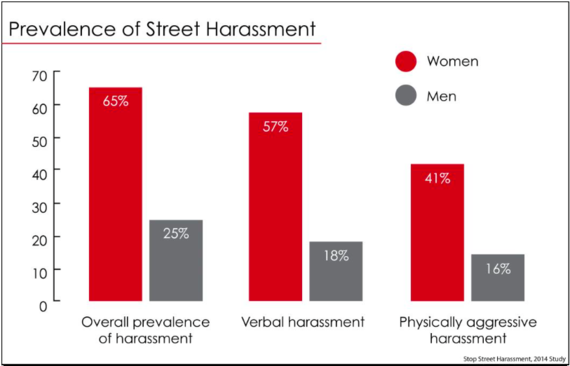
This past Saturday in Washington, D.C., was beautiful.
The warm weather encouraged me and one of my closest friends to get up early for brunch, take a walk through Capitol Hill, and sit on a patio to lean into even more champagne and cheese. It was a theme.
But we wanted to take advantage of the sunshine and walk some more, so we embarked on another, longer walk. Then someone catcalled my friend. I told the man to go fuck himself, and he repeatedly called me a faggot. Happy spring!
We walked away (looking back only to throw up our middle fingers) -- and that means we're comparatively lucky. Women have been killed for refusing to give away a phone number, or for refusing to go on a date with a stranger. Men trying to intervene have been killed, too.
While women and LGBTQ people experience year-round harassment in public spaces, warmer weather certainly does bolster opportunities for it -- not because of what someone is wearing, but simply because many people are more likely to be in public.
That's why efforts like Stop Street Harassment's (SSH) annual International Anti-Street Harassment Week, which is happening now (April 12-18), are so important. While street harassment itself is a very public, visible act, the week-long campaign is a sustained moment to make visible the message that it's not okay -- a message that groups like SSH and CASS (here in D.C.) promote every day.
According to SSH's national report on street harassment, released last spring, about two-thirds of women and a quarter of men in the United States have experienced verbal or physically aggressive harassment. Many more men who identified as LGBT than men who identified as straight reported experiencing it.
But really, these numbers shouldn't be surprising. If anything, they should seem low. In previous, informal surveys conducted by SSH, 99 percent of respondents said they had experienced some form of street harassment. And in my own research on experiences of gay and bisexual men, 90 percent said they sometimes, often, or always feel unwelcome in public spaces because of their sexual orientation.
This documentation is a good starting point, and more research is certainly needed (something scholars have noticed). But week-long actions are important, too.
This year, at least 36 countries are taking action to combat street harassment during International Anti-Street Harassment Week. Find out how to participate here (even if just online), and continue to speak out past this week by sharing your stories and staying engaged. Together, we will make a difference.

